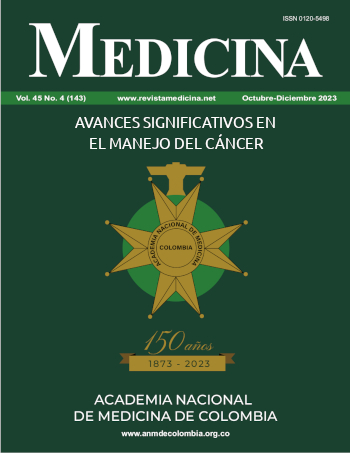Futuro diagnóstico y terapéutico del cáncer de pulmón de células no pequeñas con alteraciones genómicas
DOI:
https://doi.org/10.56050/01205498.2312Palabras clave:
Cáncer de pulmón de célula no pequeña, Terapias blanco, Inhibidores tirocin-cinasa, EGFRResumen
El cáncer de pulmón es la principal causa de muerte por cáncer a nivel mundial. Las terapias blanco o dirigidas han revolucionado el tratamiento del cáncer de pulmón de células no pequeñas (CPCNP), mejorando de forma consistente los desenlaces, sin embargo, tan solo en alrededor de un tercio de los pacientes se logra identificar alguna alteración genómica que sea susceptible de tratamiento con las terapias dirigidas. De otra parte, casi que, de forma inevitable, los pacientes se harán resistentes a estas terapias, presentando progresión de la enfermedad. Otro aspecto para tener en cuenta es el limitado acceso a estas terapias en nuestros países, lo cual reduce de forma dramática las opciones de tratamiento. En este artículo discutiremos algunos de los avances en el diagnóstico y el tratamiento del CPCNP con alteraciones genómicas y sobre los nuevos desarrollos que se esperan en este campo. Aunque la mayoría de información se centra en la enfermedad avanzada, se abordarán también los avances de las terapias dirigidas en la enfermedad temprana.
Biografía del autor/a
Jairo Zuluaga, Centro de Tratamiento e Investigación sobre Cáncer (CTIC)
Unidad Funcional Clínica Tórax, Centro de Tratamiento e Investigación sobre Cáncer (CTIC) Luis Carlos Sarmiento Angulo (CTIC), Bogotá, Colombia.
Leonardo Rojas, Centro de Tratamiento e Investigación sobre Cáncer (CTIC)
Unidad Funcional Clínica Tórax, Centro de Tratamiento e Investigación sobre Cáncer (CTIC) Luis Carlos Sarmiento Angulo (CTIC), Bogotá, Colombia.
Lucia Viola, Centro de Tratamiento e Investigación sobre Cáncer (CTIC)
Unidad Funcional Clínica Tórax, Centro de Tratamiento e Investigación sobre Cáncer (CTIC) Luis Carlos Sarmiento Angulo (CTIC), Bogotá, Colombia.
Unidad Funcional Oncología Torácica, Fundación Neumológica Colombiana – FNC, Bogotá, Colombia.
Stella Martínez, Centro de Tratamiento e Investigación sobre Cáncer (CTIC)
Unidad Funcional Clínica Tórax, Centro de Tratamiento e Investigación sobre Cáncer (CTIC) Luis Carlos Sarmiento Angulo (CTIC), Bogotá, Colombia.
Carlos Carvajal, Centro de Tratamiento e Investigación sobre Cáncer (CTIC)
Unidad Funcional Clínica Tórax, Centro de Tratamiento e Investigación sobre Cáncer (CTIC) Luis Carlos Sarmiento Angulo (CTIC), Bogotá, Colombia.
Oscar Arrieta, Instituto Nacional de Cancerología – INCaN, México
Unidad de Tumores Torácicos, Instituto Nacional de Cancerología (INCan), México D.F., México.
Andrés F. Cardona, Centro de Tratamiento e Investigación sobre Cáncer (CTIC)
Unidad Funcional Clínica Tórax, Centro de Tratamiento e Investigación sobre Cáncer (CTIC) Luis Carlos Sarmiento Angulo (CTIC), Bogotá, Colombia.
Dirección de Investigación y Educación, Centro de Tratamiento e Investigación sobre Cáncer (CTIC) Luis Carlos Sarmiento Angulo (CTIC), Bogotá, Colombia.
Referencias bibliográficas
Siegel RL, Miller KD, Fuchs HE, Jemal A. Cancer statistics, 2022. CA Cancer J Clin. 2022;72(1):7-33.
Ferlay J EM, Lam F, Colombet M, Mery L, Piñeros M, Znaor A, Soerjomataram I, Bray F. Global Cancer Observatory: Cancer Today Lyon, France: International Agency for Research on Cancer [Internet]. GCO; [Consultado julio 1 de 2023]. Disponible en: https://gco.iarc.fr/today.
Molina JR, Yang P, Cassivi SD, Schild SE, Adjei AA. Non-small cell lung cancer: epidemiology, risk factors, treatment, and survivorship. Mayo Clin Proc. 2008;83(5):584-94.
Herbst RS, Morgensztern D, Boshoff C. The biology and management of non-small cell lung cancer. Nature. 2018;553(7689):446-54.
Wang M, Herbst RS, Boshoff C. Toward personalized treatment approaches for non-small-cell lung cancer. Nature Medicine. 2021;27(8):1345-56.
Boumahdi S, De Sauvage FJ. The great escape: tumour cell plasticity in resistance to targeted therapy. Nature Reviews Drug Discovery. 2020;19(1):39-56.
Gridelli C, De Marinis F, Di Maio M, Cortinovis D, Cappuzzo F, Mok T. Gefitinib as first-line treatment for patients with advanced non-small-cell lung cancer with activating Epidermal Growth Factor Receptor mutation: implications for clinical practice and open issues. Lung Cancer. 2011;72(1):3-8.
Ramalingam SS, Vansteenkiste J, Planchard D, Cho BC, Gray JE, Ohe Y, et al. Overall Survival with Osimertinib in Untreated, EGFR-Mutated Advanced NS- CLC. N Engl J Med. 2020;382(1):41-50.
Mok T, Camidge DR, Gadgeel SM, Rosell R, Dziadziuszko R, Kim DW, et al. Updated overall survival and final progression-free survival data for patients with treatment-naive advanced ALK-positive non-small-cell lung cancer in the ALEX study. Ann Oncol. 2020;31(8):1056-64.
Bar-Sagi D, Knelson EH, Sequist LV. A bright future for KRAS inhibitors. Nature Cancer. 2020;1(1):25-7.
Spigel DR, Schrock AB, Fabrizio D, Frampton GM, Sun J, He J, et al. Total mutation burden (TMB) in lung cancer (LC) and relationship with response to PD-1/PD-L1 targeted therapies. Journal of Clinical Oncology. 2016;34(15_suppl):9017-.
Reck M, Mok TSK, Nishio M, Jotte RM, Cappuzzo F, Orlandi F, et al. Atezolizumab plus bevacizumab and chemotherapy in non-small-cell lung cancer (IM- power150): key subgroup analyses of patients with EGFR mutations or baseline liver metastases in a randomised, open-label phase 3 trial. Lancet Respir Med. 2019;7(5):387-401.
Skoulidis F, Goldberg ME, Greenawalt DM, Hellmann MD, Awad MM, Gainor JF, et al. STK11/ LKB1 Mutations and PD-1 Inhibitor Resistance in KRAS-Mutant Lung Adenocarcinoma. Cancer Discov. 2018;8(7):822-35.
Peng W, Chen JQ, Liu C, Malu S, Creasy C, Tetzlaff MT, et al. Loss of PTEN Promotes Resistance to T Cell-Mediated Immunotherapy. Cancer Discov. 2016;6(2):202-16.
Langer CJ, Redman MW, Wade JL, 3rd, Aggarwal C, Bradley JD, Crawford J, et al. SWOG S1400B (NCT02785913), a Phase II Study of GDC-0032 (Taselisib) for Previously Treated PI3K-Positive Patients with Stage IV Squamous Cell Lung Cancer (Lung- MAP Sub-Study). J Thorac Oncol. 2019;14(10):1839- 46.
Hegde PS, Wallin JJ, Mancao C. Predictive markers of anti-VEGF and emerging role of angiogenesis inhibitors as immunotherapeutics. Semin Cancer Biol. 2018;52(Pt 2):117-24.
Crispe IN. Immune tolerance in liver disease. Hepatology. 2014;60(6):2109-17.
Tumeh PC, Hellmann MD, Hamid O, Tsai KK, Loo KL, Gubens MA, et al. Liver Metastasis and Treatment Outcome with Anti-PD-1 Monoclonal Antibody in Patients with Melanoma and NSCLC. Cancer Immunol Res. 2017;5(5):417-24.
Taylor MH, Lee CH, Makker V, Rasco D, Dutcus CE, Wu J, et al. Phase IB/II Trial of Lenvatinib Plus Pembrolizumab in Patients With Advanced Renal Cell Carcinoma, Endometrial Cancer, and Other Selected Advanced Solid Tumors. J Clin Oncol. 2020;38(11):1154-63.
Neal JW, Lim FL, Felip E, Gentzler RD, Patel SB, Baranda J, et al. Cabozantinib in combination with atezolizumab in non-small cell lung cancer (NSCLC) patients previously treated with an immune checkpoint inhibitor: Results from cohort 7 of the COSMIC-021 study. Journal of Clinical Oncology. 2020;38(15_suppl):9610.
Reckamp KL, Redman MW, Dragnev KH, Minichiello K, Villaruz LC, Faller B, et al. Phase II Randomized Study of Ramucirumab and Pembrolizumab Versus Standard of Care in Advanced Non–Small-Cell Lung Cancer Previously Treated With Immunotherapy— Lung-MAP S1800A. Journal of Clinical Oncology. 2022;40(21):2295-307.
Rotow J, Bivona TG. Understanding and targeting resistance mechanisms in NSCLC. Nature Reviews Cancer. 2017;17(11):637-58.
Nguyen KS, Kobayashi S, Costa DB. Acquired resistance to epidermal growth factor receptor tyrosine kinase inhibitors in non-small-cell lung cancers dependent on the epidermal growth factor receptor pathway. Clin Lung Cancer. 2009;10(4):281-9.
Kim SY, Costa DB, Shibahara D, Kobayashi S, Halmos B. EGFR-Directed Therapy in Lung Cancer [Internet]. Cambridge: Cambridge University Press; [Consultado julio 1 de 2023]. Disponible en: https://www.cambridge.org/core/elements/egfrdirected-therapy-in-lung-cancer/CB1CE2077A311230CA583CF2C44FC768.
Yun CH, Mengwasser KE, Toms AV, Woo MS, Greulich H, Wong KK, et al. The T790M mutation in EGFR kinase causes drug resistance by increasing the affinity for ATP. Proc Natl Acad Sci U S A. 2008;105(6):2070-5.
Piotrowska Z, Hata AN. Resistance to First-line Osimertinib in EGFR-mutant NSCLC: Tissue is the Issue. Clin Cancer Res. 2020;26(11):2441-3.
Passaro A, Janne PA, Mok T, Peters S. Overcoming therapy resistance in EGFR-mutant lung cancer. Nat Cancer. 2021;2(4):377-91.
Reck M, Mok T, Socinski MA, Jotte RM, Lim DW-T, Cappuzzo F, et al. 1293P IMpower150: Updated efficacy analysis in patients with EGFR mutations. Annals of Oncology. 2020;31:S837-S8.
Cho BC, Lee KH, Cho EK, Kim D-W, Lee J-S, Han J-Y, et al. 1258O Amivantamab (JNJ-61186372), an EGFR-MET bispecific antibody, in combination with lazertinib, a 3rd-generation tyrosine kinase inhibitor (TKI), in advanced EGFR NSCLC. Annals of Oncology. 2020;31:S813.
Bauml J, Cho BC, Park K, Lee KH, CHO EK, Kim D-W, et al. Amivantamab in combination with lazertinib for the treatment of osimertinib-relapsed, chemotherapy-naïve EGFR mutant (EGFRm) non-small cell lung cancer (NSCLC) and potential biomarkers for response. Journal of Clinical Oncology. 2021;39(15_suppl):9006-.
Shu CA, Goto K, Ohe Y, Besse B, Park K, Wang Y, et al. 1193MO Amivantamab plus lazertinib in post-osimertinib, post-platinum chemotherapy EGFR-mutant non-small cell lung cancer (NSCLC): Preliminary results from CHRYSALIS-2. Annals of Oncology. 2021;32:S952-S3.
Camidge DR, Morgensztern D, Heist RS, Barve M, Vokes E, Goldman JW, et al. Phase I Study of 2- or 3-Week Dosing of Telisotuzumab Vedotin, an Antibody-Drug Conjugate Targeting c-Met, Monotherapy in Patients with Advanced Non-Small Cell Lung Carcinoma. Clin Cancer Res. 2021;27(21):5781-92.
Janne PA, Baik C, Su WC, Johnson ML, Hayashi H, Nishio M, et al. Efficacy and Safety of Patritumab Deruxtecan (HER3-DXd) in EGFR Inhibitor-Resistant, EGFR-Mutated Non-Small Cell Lung Cancer. Cancer Discov. 2022;12(1):74-89.
Schalm SS, Dineen T, Lim SM, Park CW, Hsieh J, Woessner R, et al. 1296P BLU-945, a highly potent and selective 4th generation EGFR TKI for the treatment of EGFR T790M/C797S resistant NSCLC. Annals of Oncology. 2020;31:S839.
Gainor JF, Dardaei L, Yoda S, Friboulet L, Leshchiner I, Katayama R, et al. Molecular Mechanisms of Resistance to Firstand Second-Generation ALK Inhibitors in ALK-Rearranged Lung Cancer. Cancer Discov. 2016;6(10):1118-33.
Shaw AT, Felip E, Bauer TM, Besse B, Navarro A, Postel-Vinay S, et al. Lorlatinib in non-small-cell lung cancer with ALK or ROS1 rearrangement: an international, multicentre, open-label, single-arm first-in-man phase 1 trial. Lancet Oncol. 2017;18(12):1590-9.
Lee M, Abu Rous F, Borczuk A, Liu S, Gadgeel S, Halmos B. Targeting Oncogenic Driver Mutations in Lung Cancer. [Internet]. Cambridge: Cambridge University Press; [Consultado julio 1 de 2023]. Disponible en: https://www.cambridge.org/core/elements/targeting-oncogenic-driver-mutations-in-lung-cancer/5B-47B1A513EE77DBA1EAA43030656C08.
Zhong WZ, Wang Q, Mao WM, Xu ST, Wu L, Shen Y, et al. Gefitinib versus vinorelbine plus cisplatin as adjuvant treatment for stage II-IIIA (N1-N2) EG- FR-mutant NSCLC (ADJUVANT/CTONG1104): a randomised, open-label, phase 3 study. Lancet Oncol. 2018;19(1):139-48.
Wu YL, Tsuboi M, He J, John T, Grohe C, Majem M, et al. Osimertinib in Resected EGFR-Mutated Non-Small-Cell Lung Cancer. N Engl J Med. 2020;383(18):1711-23.
Tsuboi M, Herbst RS, John T, Kato T, Majem M, Grohe C, et al. Overall Survival with Osimertinib in Resected EGFR-Mutated NSCLC. N Engl J Med. 2023.
Chaft JE, Shyr Y, Sepesi B, Forde PM. Preoperative and Postoperative Systemic Therapy for Operable Non–Small-Cell Lung Cancer. Journal of Clinical Oncology. 2022;40(6):546-55.
Shaw AT, Riely GJ, Bang YJ, Kim DW, Camidge DR, Solomon BJ, et al. Crizotinib in ROS1-rearranged advanced non-small-cell lung cancer (NSCLC): updated results, including overall survival, from PROFILE 1001. Ann Oncol. 2019;30(7):1121-6.
Kim ES, Herbst RS, Wistuba, II, Lee JJ, Blumenschein GR, Jr., Tsao A, et al. The BATTLE trial: personalizing therapy for lung cancer. Cancer Discov. 2011;1(1):44-53.
Herbst RS, Gandara DR, Hirsch FR, Redman MW, LeBlanc M, Mack PC, et al. Lung Master Protocol (Lung-MAP)-A Biomarker-Driven Protocol for Accelerating Development of Therapies for Squamous Cell Lung Cancer: SWOG S1400. Clin Cancer Res. 2015;21(7):1514-24.
Middleton G, Fletcher P, Popat S, Savage J, Summers Y, Greystoke A, et al. The National Lung Matrix Trial of personalized therapy in lung cancer. Nature. 2020;583(7818):807-12.
Vasan N, Baselga J, Hyman DM. A view on drug resistance in cancer. Nature. 2019;575(7782):299-309.
Palmer AC, Sorger PK. Combination Cancer Therapy Can Confer Benefit via Patient-to-Patient Variability without Drug Additivity or Synergy. Cell. 2017;171(7):1678-91 e13.
Siegel RL, Miller KD, Fuchs HE, Jemal A. Cancer Statistics, 2021. CA Cancer J Clin. 2021;71(1):7-33.
Cómo citar
Descargas
Publicado
Número
Sección
Licencia
Copyright
ANM de Colombia
Los autores deben declarar revisión, validación y aprobación para publicación del manuscrito, además de la cesión de los derechos patrimoniales de publicación, mediante un documento que debe ser enviado antes de la aparición del escrito. Puede solicitar el formato a través del correo revistamedicina@anmdecolombia.org.co o descargarlo directamente Documento Garantías y cesión de derechos.docx
Copyright
ANM de Colombia
Authors must state that they reviewed, validated and approved the manuscript's publication. Moreover, they must sign a model release that should be sent.

| Estadísticas de artículo | |
|---|---|
| Vistas de resúmenes | |
| Vistas de PDF | |
| Descargas de PDF | |
| Vistas de HTML | |
| Otras vistas | |




